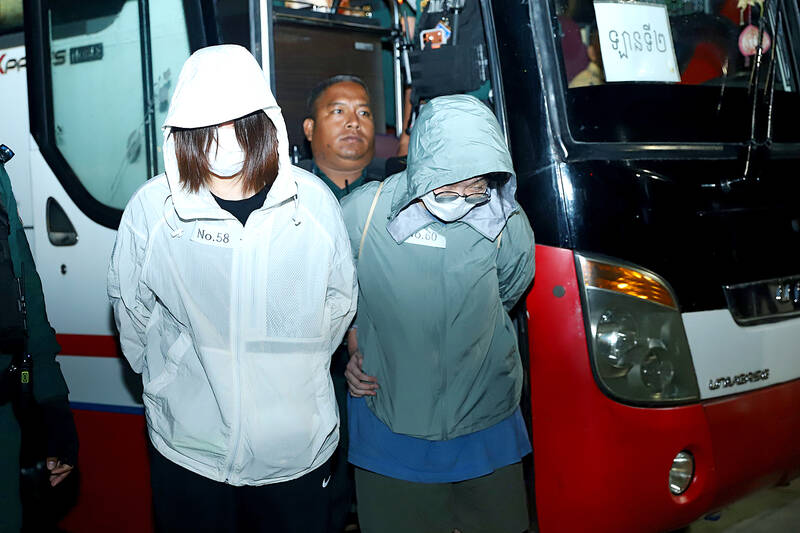Sixty-four South Koreans detained in Cambodia over alleged online scam operations returned home yesterday, with most expected to face investigation, South Korean authorities said.
Their return followed the alleged murder of a South Korean college student who was tortured in Cambodia in August in a case linked to an employment scam, South Korean news media reported.
The returnees were escorted by police after their arrival at Incheon Airport in Seoul, their hands appearing to be cuffed, but covered with cloth.

Photo: Agence Kampuchea Press via AP
South Korea this week issued a “code black” travel ban for parts of Cambodia, and dispatched a team of high-level officials to help nationals lured into working in scam compounds and secure the release of those held against their will.
South Korean National Security Adviser Wi Sung-lac said that more than 1,000 South Koreans are believed to be among about 200,000 people of various nationalities involved in the scam compounds in Cambodia.
South Korean President Lee Jae-myung on Friday ordered an urgent removal of online illegal job advertisements — not only for Cambodia, but also for Southeast Asia as a whole — to stem the flow of nationals being lured in the first place.
South Korean Second Vice Minister of Foreign Affairs Kim Jina said that the repatriation “confirmed the Cambodian government’s continued crackdown” on scam operations and its close cooperation with Seoul on the matter.
“Our government will build and actively use an effective system to eradicate scams targeting South Koreans in Cambodia,” she said.
A senior police official said that Cambodian authorities had agreed to notify Seoul of arrests of South Koreans and send them home to face justice under South Korean law.
Authorities would focus on uncovering the structure, scale,and networks behind the scams, which often involve voice phishing operations, they said.

Yemen’s separatist leader has vowed to keep working for an independent state in the country’s south, in his first social media post since he disappeared earlier this month after his group briefly seized swathes of territory. Aidarous al-Zubaidi’s United Arab Emirates (UAE)-backed Southern Transitional Council (STC) forces last month captured two Yemeni provinces in an offensive that was rolled back by Saudi strikes and Riyadh’s allied forces on the ground. Al-Zubaidi then disappeared after he failed to board a flight to Riyadh for talks earlier this month, with Saudi Arabia accusing him of fleeing to Abu Dhabi, while supporters insisted he was

‘SHOCK TACTIC’: The dismissal of Yang mirrors past cases such as Jang Song-thaek, Kim’s uncle, who was executed after being accused of plotting to overthrow his nephew North Korean leader Kim Jong-un has fired his vice premier, compared him to a goat and railed against “incompetent” officials, state media reported yesterday, in a rare and very public broadside against apparatchiks at the opening of a critical factory. Vice Premier Yang Sung-ho was sacked “on the spot,” the state-run Korean Central News Agency said, in a speech in which Kim attacked “irresponsible, rude and incompetent leading officials.” “Please, comrade vice premier, resign by yourself when you can do it on your own before it is too late,” Kim reportedly said. “He is ineligible for an important duty. Put simply, it was

The Chinese Embassy in Manila yesterday said it has filed a diplomatic protest against a Philippine Coast Guard spokesman over a social media post that included cartoonish images of Chinese President Xi Jinping (習近平). Philippine Coast Guard spokesman Jay Tarriela and an embassy official had been trading barbs since last week over issues concerning the disputed South China Sea. The crucial waterway, which Beijing claims historic rights to despite an international ruling that its assertion has no legal basis, has been the site of repeated clashes between Chinese and Philippine vessels. Tarriela’s Facebook post on Wednesday included a photo of him giving a

Syrian President Ahmed al-Sharaa on Sunday announced a deal with the chief of Kurdish-led forces that includes a ceasefire, after government troops advanced across Kurdish-held areas of the country’s north and east. Syrian Kurdish leader Mazloum Abdi said he had agreed to the deal to avoid a broader war. He made the decision after deadly clashes in the Syrian city of Raqa on Sunday between Kurdish-led forces and local fighters loyal to Damascus, and fighting this month between the Kurds and government forces. The agreement would also see the Kurdish administration and forces integrate into the state after months of stalled negotiations on